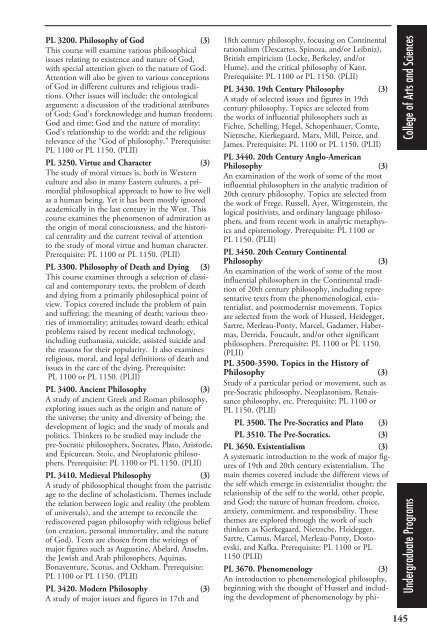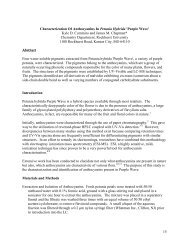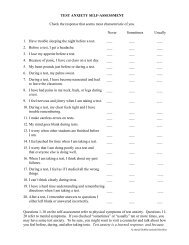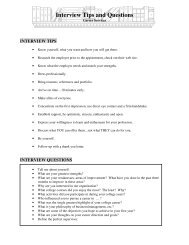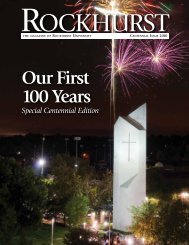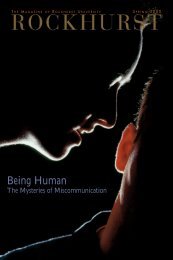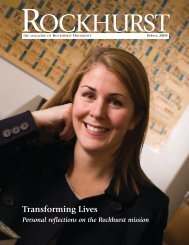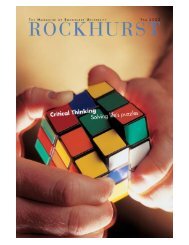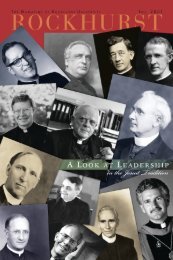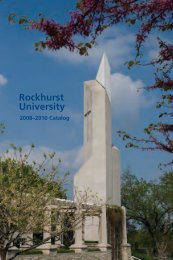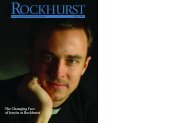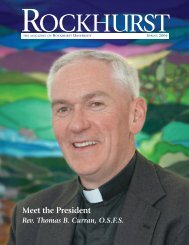RockhuRst univeRsity 2012â2014 catalog
RockhuRst univeRsity 2012â2014 catalog
RockhuRst univeRsity 2012â2014 catalog
- No tags were found...
You also want an ePaper? Increase the reach of your titles
YUMPU automatically turns print PDFs into web optimized ePapers that Google loves.
PL 3200. Philosophy of God (3)This course will examine various philosophicalissues relating to existence and nature of God,with special attention given to the nature of God.Attention will also be given to various conceptionsof God in different cultures and religious traditions.Other issues will include: the ontologicalargument; a discussion of the traditional attributesof God; God’s foreknowledge and human freedom;God and time; God and the nature of morality;God’s relationship to the world; and the religiousrelevance of the “God of philosophy.” Prerequisite:PL 1100 or PL 1150. (PLII)PL 3250. Virtue and Character (3)The study of moral virtues is, both in Westernculture and also in many Eastern cultures, a primordialphilosophical approach to how to live wellas a human being. Yet it has been mostly ignoredacademically in the last century in the West. Thiscourse examines the phenomenon of admiration asthe origin of moral consciousness, and the historicalcentrality and the current revival of attentionto the study of moral virtue and human character.Prerequisite: PL 1100 or PL 1150. (PLII)PL 3300. Philosophy of Death and Dying (3)This course examines through a selection of classicaland contemporary texts, the problem of deathand dying from a primarily philosophical point ofview. Topics covered include the problem of painand suffering; the meaning of death; various theoriesof immortality; attitudes toward death; ethicalproblems raised by recent medical technology,including euthanasia, suicide, assisted suicide andthe reasons for their popularity. It also examinesreligious, moral, and legal definitions of death andissues in the care of the dying. Prerequisite:PL 1100 or PL 1150. (PLII)PL 3400. Ancient Philosophy (3)A study of ancient Greek and Roman philosophy,exploring issues such as the origin and nature ofthe universe; the unity and diversity of being; thedevelopment of logic; and the study of morals andpolitics. Thinkers to be studied may include thepre-Socratic philosophers, Socrates, Plato, Aristotle,and Epicurean, Stoic, and Neoplatonic philosophers.Prerequisite: PL 1100 or PL 1150. (PLII)PL 3410. Medieval Philosophy (3)A study of philosophical thought from the patristicage to the decline of scholasticism. Themes includethe relation between logic and reality (the problemof universals), and the attempt to reconcile therediscovered pagan philosophy with religious belief(on creation, personal immortality, and the natureof God). Texts are chosen from the writings ofmajor figures such as Augustine, Abelard, Anselm,the Jewish and Arab philosophers, Aquinas,Bonaventure, Scotus, and Ockham. Prerequisite:PL 1100 or PL 1150. (PLII)PL 3420. Modern Philosophy (3)A study of major issues and figures in 17th and18th century philosophy, focusing on Continentalrationalism (Descartes, Spinoza, and/or Leibniz),British empiricism (Locke, Berkeley, and/orHume), and the critical philosophy of Kant.Prerequisite: PL 1100 or PL 1150. (PLII)PL 3430. 19th Century Philosophy (3)A study of selected issues and figures in 19thcentury philosophy. Topics are selected fromthe works of influential philosophers such asFichte, Schelling, Hegel, Schopenhauer, Comte,Nietzsche, Kierkegaard, Marx, Mill, Peirce, andJames. Prerequisite: PL 1100 or PL 1150. (PLII)PL 3440. 20th Century Anglo-AmericanPhilosophy (3)An examination of the work of some of the mostinfluential philosophers in the analytic tradition of20th century philosophy. Topics are selected fromthe work of Frege, Russell, Ayer, Wittgenstein, thelogical positivists, and ordinary language philosophers,and from recent work in analytic metaphysicsand epistemology. Prerequisite: PL 1100 orPL 1150. (PLII)PL 3450. 20th Century ContinentalPhilosophy (3)An examination of the work of some of the mostinfluential philosophers in the Continental traditionof 20th century philosophy, including representativetexts from the phenomenological, existentialist,and postmodernist movements. Topicsare selected from the work of Husserl, Heidegger,Sartre, Merleau-Ponty, Marcel, Gadamer, Habermas,Derrida, Foucault, and/or other significantphilosophers. Prerequisite: PL 1100 or PL 1150.(PLII)PL 3500-3590. Topics in the History ofPhilosophy (3)Study of a particular period or movement, such aspre-Socratic philosophy, Neoplatonism, Renaissancephilosophy, etc. Prerequisite: PL 1100 orPL 1150. (PLII)PL 3500. The Pre-Socratics and Plato (3)PL 3510. The Pre-Socratics. (3)PL 3650. Existentialism (3)A systematic introduction to the work of major figuresof 19th and 20th century existentialism. Themain themes covered include the different views ofthe self which emerge in existentialist thought; therelationship of the self to the world, other people,and God; the nature of human freedom, choice,anxiety, commitment, and responsibility. Thesethemes are explored through the work of suchthinkers as Kierkegaard, Nietzsche, Heidegger,Sartre, Camus, Marcel, Merleau-Ponty, Dostoevski,and Kafka. Prerequisite: PL 1100 or PL1150 (PLII)PL 3670. Phenomenology (3)An introduction to phenomenological philosophy,beginning with the thought of Husserl and includingthe development of phenomenology by phi-Undergraduate College of Arts Programs & SciencesCollege of Arts and Sciences145


